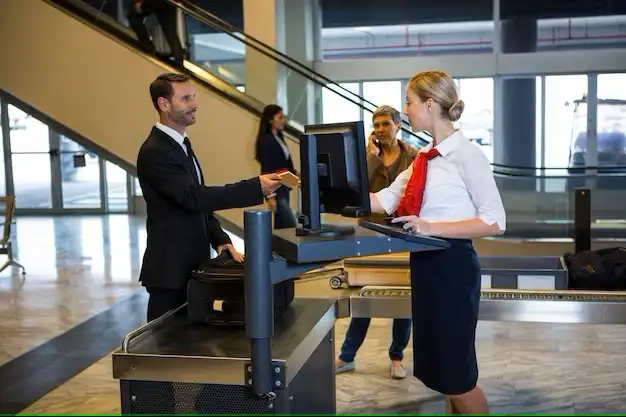Local SEO Strategies for Aviation Businesses: Reach New Heights Online

Local SEO is an indispensable tool for aviation businesses seeking to elevate their online presence and engage with their local customer base effectively. In the fiercely competitive aviation industry, where trust and credibility are paramount, optimizing your digital footprint for local searches is crucial.
Local SEO is a game-changer for aviation businesses aiming to conquer the digital skies. In today’s interconnected world, mastering local SEO is the flight plan to connect with local customers, soar above the competition, and ensure that your aviation business reaches new heights online.
The world has become increasingly connected, and potential customers often turn to search engines like Google to find local aviation services, whether it’s booking flights, maintenance services, or flight training schools. This blog post will explore the ins and outs of local SEO and how aviation businesses can leverage it to stand out in the crowd and attract more local customers.
Table of Contents
Understanding Local SEO
Understanding local SEO is essential for businesses aiming to capture their local market and thrive in an increasingly digital landscape. Local SEO, or Local Search Engine Optimization, is a specialized branch of digital marketing that focuses on enhancing a business’s online visibility in local search results.
At its core, local SEO is about ensuring that your business information, such as name, address, phone number (NAP), and website, is consistent and accurately represented across online platforms and directories. This consistency is critical for search engines like Google to trust and display your business in local search results.

The significance of local SEO lies in its ability to connect businesses with their nearby customer base. When people search for products or services ‘near me,’ local SEO ensures that your business appears prominently in those search results. This is especially vital for brick-and-mortar businesses, service providers, and professionals who depend on attracting local customers.
Local SEO differs from traditional SEO in several key ways. While traditional SEO seeks to optimize a website’s overall online presence, local SEO narrows its focus to a specific geographic area. It takes into account the user’s location when displaying search results, providing them with relevant local businesses. Traditional SEO tends to prioritize national or global visibility, whereas local SEO emphasizes community engagement.
Moreover, local SEO requires a more nuanced approach to keyword research, as it involves targeting location-specific keywords and phrases. Content and backlink strategies are also tailored to garner local authority, often through reviews and local directories.
Local SEO is about putting your business on the digital map, ensuring it’s discoverable by the people in your immediate vicinity. It’s a powerful tool for enhancing your local market presence and differentiates itself from traditional SEO through its geographic focus and specialized optimization techniques. Understanding and effectively implementing local SEO strategies can be the key to your business’s success in the local market.

The Aviation Industry's Local SEO Challenges
Navigating local SEO in the aviation industry presents a unique set of challenges that demand careful consideration and tailored strategies. Understanding these challenges is crucial for aviation businesses aiming to excel in their local markets.
One of the primary challenges for aviation businesses in local SEO is the highly specialized nature of the industry. Aviation terminology, services, and products are distinct, requiring precise keyword research and content creation. This specificity makes it vital for aviation businesses to grasp the language used by their target audience when conducting online searches.
Additionally, the competitive landscape in the aviation sector is fierce. Many businesses vie for the same local customers, whether it’s airlines, aircraft maintenance providers, or flight schools. This intense competition necessitates a strategic approach to local SEO. Standing out from the crowd requires more than just basic optimization; it demands innovative tactics and a deep understanding of the industry’s pain points and customer needs.
Furthermore, trust and reputation are paramount in the aviation industry. Customers expect reliability and safety, making online reviews and reputation management pivotal. Negative reviews or a lack of online presence can deter potential customers and hinder local SEO efforts. It’s imperative for aviation businesses to proactively encourage positive reviews and address any negative feedback promptly and professionally.
The aviation industry’s local SEO challenges stem from its specialized nature and the competitive landscape. Addressing these challenges involves comprehensive keyword research, industry-specific content creation, and an unwavering commitment to building and maintaining a positive online reputation. By surmounting these hurdles, aviation businesses can effectively rise above the competition in their local markets.
Key Local SEO Strategies for Aviation Businesses
Key local SEO strategies for aviation businesses include optimizing Google My Business listings, conducting targeted local keyword research, creating aviation-specific content, building authoritative local backlinks, ensuring mobile optimization, and actively managing online reviews and reputation. These tactics help aviation businesses enhance their online visibility, engage with local customers effectively, and outshine competitors in the local market. By focusing on these strategies, aviation businesses can establish themselves as trusted authorities in their industry while capturing the attention of nearby customers seeking aviation services.

Optimizing Google My Business (GMB)

Optimizing Google My Business (GMB) is a critical aspect of local SEO for aviation businesses. A well-optimized GMB listing not only boosts your online visibility but also ensures that potential customers find accurate and comprehensive information about your aviation services when they search online.
Importance of a Well-Optimized GMB Listing: A properly optimized GMB listing offers several key advantages. Firstly, it increases your chances of appearing in the local “3-pack” of search results, which prominently displays top businesses for local queries. Secondly, it enhances your overall online presence, making it easier for customers to discover your services and contact you. Lastly, it fosters trust and credibility, as a complete and up-to-date listing conveys professionalism and reliability to potential customers.
Step-by-Step Guidance on Optimizing GMB for Aviation Businesses:
Claim and Verify Your Listing: If you haven’t already, claim your GMB listing and verify your business with Google. This step is crucial to gain control over your listing’s information.
Complete Your Profile: Fill out every section of your GMB profile comprehensively. Include your business name, address, phone number, website URL, operating hours, and accurate categories (e.g., “Aviation Services” or “Aircraft Maintenance”).
Add High-Quality Images: Upload high-resolution images of your aviation facilities, aircraft, staff, and any other relevant visuals. These images make your listing more appealing and trustworthy.
Write an Informative Description: Craft a concise yet informative business description that highlights your aviation services, expertise, and what sets you apart from competitors.
Encourage Customer Reviews: Prompt satisfied customers to leave reviews on your GMB listing. Respond to reviews, whether positive or negative, to show engagement and dedication to customer satisfaction.
Regular Updates: Keep your GMB profile updated with any changes to your business information, such as new services, special offers, or holiday hours.
Utilize Posts: Take advantage of GMB posts to share aviation-related news, promotions, and events. This keeps your listing fresh and engaging.
By following these steps, aviation businesses can optimize their GMB listings effectively, ensuring that they appear prominently in local search results and leave a positive impression on potential customers seeking aviation services in their area.

Local Keyword Research for aviation businesses
Local keyword research is a cornerstone of successful local SEO strategies for aviation businesses. Targeting aviation-related local keywords is crucial because it ensures that your content and website are aligned with the specific language and needs of your target audience in your local area. Here’s why it’s essential:
Relevance to Local Audience: Aviation enthusiasts and potential customers in your area are more likely to use local search terms when seeking aviation services. By incorporating these keywords, you increase the chances of your business appearing in their search results.
Competition Differentiation: Local keywords often face less competition than broader, national-level keywords. This presents an opportunity to stand out in local search results and compete effectively in your local market.
To conduct effective local keyword research for aviation businesses:
Understand Your Audience: Put yourself in the shoes of your target customers. Consider what aviation services they are looking for and the language they might use in their search queries.
Use Keyword Research Tools: Leverage keyword research tools like Google Keyword Planner, SEMrush, or Moz to identify aviation-related local keywords with reasonable search volume and low to moderate competition.
Analyze Competitor Keywords: Study the keywords your competitors are targeting in their content and metadata. This can provide valuable insights into what’s working in your industry.
Long-Tail Keywords: Don’t neglect long-tail keywords – these are longer, more specific phrases that often indicate strong user intent. For example, “flight training schools in [your city]” or “aircraft maintenance services near me.”
Consider Synonyms and Variations: Include synonyms and variations of your primary keywords to capture a broader range of search queries. Search engines have become better at understanding context and semantics.
Location-Based Keywords: Incorporate location-based keywords such as your city or region to ensure that your content is optimized for local searches.
By conducting comprehensive local keyword research and strategically integrating these keywords into your website content, you can effectively reach and engage your local aviation audience, boosting your visibility and authority in the local market.
On-Page SEO for aviation businesses

Optimizing website pages for local SEO is a crucial step for aviation businesses looking to connect with their local customer base effectively. Here’s how to do it:
Keyword Optimization: Start by incorporating aviation-specific local keywords strategically throughout your content. These keywords should include terms related to your aviation services and your specific location. For instance, if you’re an aviation school in Miami, use phrases like “Miami flight training” or “Pilot school in Miami” naturally in your content.
Meta Tags: Optimize your meta title and meta description with relevant local keywords. These are the snippets that appear in search engine results and play a significant role in attracting clicks from users.
Header Tags: Use header tags (H1, H2, H3, etc.) to structure your content. Include local keywords in these headers, especially in the H1 tag, to provide search engines with a clear understanding of your page’s topic.
Content Quality: Create high-quality, informative, and engaging content that caters to the needs of your local aviation audience. Use aviation-specific language and terminology to showcase your expertise and authority in the field.
Optimized Images: If your website contains images of aircraft, facilities, or staff, optimize the image file names and alt text with aviation-related local keywords. This not only enhances SEO but also improves accessibility for visually impaired users.
Mobile Optimization: Ensure that your website is mobile-responsive, as mobile-friendliness is a ranking factor for both local and traditional SEO. Mobile optimization guarantees a seamless user experience for visitors on smartphones and tablets.
Local Schema Markup: Implement schema markup to provide search engines with structured data about your aviation business, including your location, services, and contact information. This can lead to richer search results, including knowledge panels and featured snippets.
Local Linking: Internally link to other relevant pages on your website and externally link to authoritative aviation sources. This helps search engines understand the context of your content and enhances user experience.
By optimizing your website pages for local SEO with aviation-specific keywords, you increase your chances of ranking higher in local search results and attracting local customers who are specifically seeking aviation services in your area. This focused approach ensures that your website aligns with the needs and preferences of your local aviation audience.
Local Link Building

Local link building is a valuable component of a robust local SEO strategy for aviation businesses, offering several significant advantages:
Boosts Local Authority: Acquiring local backlinks from reputable sources in your area enhances your business’s authority and relevance in the local aviation community. This, in turn, increases your visibility in local search results.
Enhances Credibility: When other local aviation businesses or organizations link to your website, it serves as a vote of confidence in your expertise and services. This can bolster your credibility and trustworthiness among potential customers.
Increased Referral Traffic: Quality local backlinks can drive targeted referral traffic to your website. Visitors who come from these links are more likely to be interested in your aviation services, increasing the likelihood of conversions.
To acquire quality local backlinks for your aviation business:
Local Partnerships: Establish partnerships or collaborations with other local aviation-related businesses, such as flight schools, aircraft maintenance providers, or aviation clubs. These partnerships can lead to natural backlinks from their websites.
Local Directories: Ensure that your business is listed in local aviation directories, chambers of commerce, and business associations. These listings often include backlinks to your website and provide valuable local citations.
Local Sponsorships and Events: Sponsor local aviation events or initiatives. Event organizers often list sponsors on their websites, providing an opportunity for backlinks.
Community Involvement: Engage with your local aviation community by participating in events, workshops, or forums. Active involvement can lead to mentions and backlinks from local aviation enthusiasts and organizations.
Local News and PR: Distribute press releases or aviation-related news through local media outlets. When your business is featured in local news articles or press releases, it often results in authoritative backlinks.
Guest Blogging: Write informative and relevant guest blog posts for local aviation blogs or news websites. In your author bio, include a link to your website.
Remember that the key to successful local link building is to prioritize quality over quantity. Focus on obtaining backlinks from authoritative and relevant sources within the aviation industry in your local area. These high-quality links will not only improve your local SEO but also reinforce your position as a trusted aviation business in your community.

Mobile Optimization
Mobile optimization is paramount for aviation businesses looking to excel in local SEO, given the increasing use of smartphones for online searches. Here’s why it’s crucial:
User Experience: Mobile-friendliness enhances the user experience, reducing bounce rates and improving engagement. For aviation businesses, this means potential customers can easily access information about your services, location, and contact details on their mobile devices, leading to higher chances of conversion.
Google’s Mobile-First Indexing: Google prioritizes mobile-friendly websites in its search results, especially for local queries. A well-optimized mobile site can significantly boost your rankings in local search results, helping you stand out in your area.
To optimize aviation websites for mobile users:
Responsive Design: Ensure your website employs responsive design principles, adapting seamlessly to various screen sizes and orientations. This guarantees that your content remains accessible and visually appealing on mobile devices.
Fast Loading Times: Optimize images and reduce unnecessary elements to keep your mobile site loading quickly. Mobile users have little patience for slow-loading pages.
Clear Navigation: Simplify navigation by using clear menus and buttons. Ensure that users can easily find essential information such as your aviation services, location, and contact details.
Mobile-Friendly Content: Create content that’s easy to read and digest on smaller screens. Break up long paragraphs, use legible fonts, and prioritize concise, relevant information.
Optimize Forms: If you have contact forms, streamline them for mobile users. Keep them short and user-friendly to encourage inquiries or bookings.
Test Across Devices: Regularly test your aviation website on various mobile devices and browsers to ensure a consistent and smooth user experience.
By prioritizing mobile optimization, aviation businesses not only improve their local SEO but also provide a superior experience for potential customers, increasing the likelihood of engagement and conversions. In an era where mobile usage is on the rise, mobile-friendliness is a prerequisite for success in the local market.
Online Reviews and Reputation Management

Online reviews wield significant influence over local SEO for aviation businesses. Here’s how they impact your online presence and what you can do about it:
Impact on Local SEO: Search engines, like Google, factor online reviews into their local search algorithms. Positive reviews indicate credibility and reliability, leading to improved rankings in local search results. On the flip side, negative reviews can harm your visibility.
User Trust and Engagement: Online reviews are influential in shaping prospective customers’ perceptions. Positive reviews build trust and encourage engagement, increasing the likelihood of users choosing your aviation services.
To encourage positive reviews and manage your online reputation:
Ask for Reviews: Proactively request reviews from satisfied customers. Send follow-up emails or messages after successful interactions, politely asking for their feedback.
Simplify the Review Process: Make it easy for customers to leave reviews. Provide direct links to your Google My Business page or other review platforms.
Incentivize Reviews Ethically: Offer incentives like discounts or small giveaways to customers who leave reviews, but ensure you comply with review platform guidelines and regulations.
Respond to Reviews: Engage with both positive and negative reviews. Thank customers for their positive feedback and address concerns in negative reviews professionally and constructively. Show your commitment to customer satisfaction.
Monitor Review Platforms: Keep a vigilant eye on review platforms like Google, Yelp, or aviation-specific directories. Set up alerts to promptly respond to new reviews.
Leverage Positive Reviews: Showcase positive reviews on your website and social media platforms. Highlighting happy customer experiences reinforces your reputation.
Learn and Improve: Use feedback from reviews as valuable insights into your business’s strengths and areas for improvement. Act on constructive criticism to enhance customer experiences.
Online reviews play a pivotal role in aviation businesses’ local SEO and overall reputation. By actively encouraging positive reviews and addressing negative ones with professionalism and care, aviation businesses can build trust, improve search rankings, and thrive in the competitive local market.
Get a Free One-on-One Consultations
+8801997310000

Aviation-specific Content Creation
Creating aviation-specific content tailored to local audiences is a powerful way for aviation businesses to connect with potential customers and enhance their local SEO efforts. Here are some content ideas and why they matter:
Local Event Coverage: Attend and report on local aviation events, airshows, or air races. Share photos, videos, and insights, demonstrating your involvement in the local aviation community.
Aviation Safety Tips: Create informative articles or videos about aviation safety measures, especially relevant for local flight training schools. This positions your business as a trusted source for safety-conscious individuals.
Maintenance Guides: Share maintenance tips and guides for aircraft owners and operators. Highlight your expertise in aircraft maintenance and attract local clients in need of your services.
Local Pilot Spotlights: Showcase local pilots’ stories, achievements, and experiences. This fosters a sense of community and engagement among local aviation enthusiasts.
Customer Testimonials: Feature success stories and testimonials from satisfied customers who have benefited from your aviation services. Real-life experiences build trust and credibility.
Local Airport Profiles: Provide detailed profiles of local airports, including facilities, services, and amenities. This information is invaluable for travelers and can attract them to your area.
FAQs and How-Tos: Answer common aviation-related questions and offer how-to guides. These resources position your business as an authority in the field and aid local search queries.
Informative and engaging content is essential because it not only educates your audience but also keeps them coming back for more. Well-crafted content showcases your expertise, builds trust, and encourages sharing, which can expand your reach within the local aviation community. Consistently delivering valuable content can establish your aviation business as a go-to resource in your area, ultimately boosting your local SEO efforts and attracting more local customers.
Measuring Local SEO Success

Measuring the success of your local SEO efforts is vital to gauge the effectiveness of your strategies and make necessary adjustments. Here’s why it matters and how to go about it:
Key Metrics and Tools: Tracking local SEO performance involves analyzing various metrics. Key indicators include:
- Rankings: Monitor your search engine rankings for relevant keywords in your local market.
- Organic Traffic: Measure the increase in organic traffic to your website from local search queries.
- Click-Through Rate (CTR): Assess the percentage of users clicking on your website in search results.
- Conversion Rate: Analyze the rate at which visitors from local search queries convert into customers.
- Google My Business Insights: Utilize GMB’s insights to track actions, queries, and audience engagement.
- Local Citations: Keep an eye on the consistency and accuracy of your business information across online directories.
Tools like Google Analytics, Google Search Console, and third-party SEO platforms can help you track and analyze these metrics effectively.
Continuous Monitoring and Adjustments: Local SEO is an ongoing process. The digital landscape, search algorithms, and customer behaviors evolve. Continuous monitoring allows you to adapt to these changes swiftly. Regularly audit your website, GMB listing, and online citations to ensure they remain accurate and up to date.
Adjustments may include refining your keyword strategy, optimizing content, addressing technical SEO issues, or revising your online reputation management tactics. A proactive approach ensures that your aviation business maintains its competitive edge in the local market and continues to attract local customers effectively.
Measuring local SEO success through relevant metrics and tools is crucial for refining your strategies and staying ahead in the local market. Continuous monitoring and adjustments ensure that your aviation business remains visible and competitive in your area, ultimately driving more local customers to your services.

Case Studies and Success Stories
Case studies and success stories in local SEO for aviation businesses serve as powerful testimonials of effective strategies and tangible results. Sharing these real-life examples not only highlights the benefits of local SEO but also inspires confidence in potential customers. Here’s why they are essential:
Demonstrate Success: Case studies provide concrete evidence of the impact of local SEO on aviation businesses. They showcase how specific tactics, like optimizing Google My Business listings or conducting local link building, led to measurable improvements.
Inspire Confidence: When potential customers see how other aviation businesses have thrived with local SEO, they’re more likely to trust your services. Success stories serve as testimonials, reinforcing your credibility.
Educate and Inform: Case studies offer valuable insights into the strategies and tactics that work in the aviation industry. They can educate your audience about the importance of local SEO and how it can benefit their own businesses.
Highlight Real-World Results: By sharing metrics and data from successful local SEO campaigns, you demonstrate the actual improvements in online visibility, rankings, traffic, and customer engagement. This substantiates the value of your services.
For instance, you can showcase how a local flight school saw a significant increase in inquiries and bookings after optimizing its Google My Business listing and local keywords. Or, how an aircraft maintenance provider improved its local rankings and attracted more clients through local link building efforts.
Incorporating case studies and success stories into your aviation business’s marketing materials, website, or social media can significantly influence potential customers and reinforce your expertise in local SEO. These real-life examples bring your success to the forefront and can be a decisive factor for local customers seeking aviation services.

FAQ
Local SEO (Search Engine Optimization) is a digital marketing strategy focused on improving a business’s visibility in local search results. It’s vital for aviation businesses as it helps them connect with nearby customers who are actively searching for aviation services. This local targeting enhances online visibility, credibility, and the potential for local customer engagement.
To optimize GMB, ensure your listing is complete and accurate with your business details, images, and service offerings. Encourage customer reviews and respond to them promptly. Regularly update your GMB profile with new information and posts about your aviation services and events.
Online reviews significantly impact local SEO by influencing search rankings and user trust. Positive reviews enhance visibility, while negative ones can harm it. Aviation businesses should actively encourage satisfied customers to leave reviews and address any negative feedback professionally.
Aviation-specific content demonstrates expertise and relevance to local audiences. It engages potential customers who seek aviation services or information, making your website a valuable resource. This content not only attracts local visitors but also boosts your local SEO rankings.
To measure local SEO success, track metrics like local search rankings, organic traffic, click-through rates, conversion rates, and Google My Business insights. Continuously monitor these metrics and make necessary adjustments to optimize your local SEO strategy effectively.
conclusion
Local SEO is a powerful tool for aviation businesses looking to expand their online presence and connect with local customers. By understanding the unique challenges of the aviation industry and implementing the key strategies outlined above, you can soar to new heights online.local SEO is the lifeline for aviation businesses seeking online success in their local markets. Optimizing Google My Business, leveraging aviation-specific keywords, fostering online reviews, and offering informative content are all essential strategies. By monitoring performance metrics and sharing success stories, aviation businesses can thrive in a competitive industry. In today’s digital age, prioritizing local SEO is not an option but a necessity. So, take flight with local SEO, connect with your local audience, and watch your aviation business soar to new heights online.
